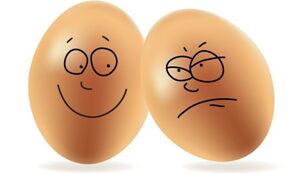每天吃鸡蛋真的没问题吗?
When it comes to foods with confusing health messages, eggs may take the cake: Despite being a long-time breakfast and baking staple, health experts warned for years against eating them-especially the yolks-on a super-regular basis, for fears that doing so could raise cholesterol and contribute to heart disease.
有些食物的健康价值令人困惑,鸡蛋就是其中之一。尽管长久以来都被当作早餐和烘焙主食,但多年来,健康专家一直反对经常性的吃鸡蛋--尤其是蛋黄,因为担心吃鸡蛋会使胆固醇水平升高,导致心脏病。
In recent years, however, doctors and nutritionists have softened their stance on the incredible edible, and many have touted eggs' abundance of important vitamins, minerals, and protein. And now, a new study appears to support the notion that eggs really aren't dangerous to heart health, after all.
然而,近年来,医生和营养家对这一令人难以置信的食用品的态度有所软化,许多人甚至鼓吹鸡蛋含有大量的重要维生素、矿物质和蛋白质。现而今,一项新的研究似乎支持这一观点:鸡蛋真的不会对心脏健康带来危害。

So, is it really okay-healthy, even-to eat eggs every day? For the bottom line on this often misunderstood topic, Health spoke with Peter Schulman, MD, a cardiologist and professor of medicine at the University of Connecticut. Here's what he wants breakfast lovers everywhere to know.
所以,每天吃鸡蛋真的没问题吗?真的健康吗?为了探究这一经常被误解话题的底线,《健康》杂志对话了康涅狄格大学的医学教授、心脏病专家彼特·舒尔曼医学博士。他希望早餐爱好者知道这些事。
Eggs have cholesterol-but that's not necessarily a bad thing
鸡蛋含有胆固醇--但并不一定是件坏事
It's true that eggs have a higher level of dietary cholesterol than many other foods-about 185 mg in one large egg. Not too long ago, eggs were even branded "as bad for you as smoking."
的确,鸡蛋含有的膳食胆固醇水平高于许多其它食物--一个个头大点的鸡蛋约含185毫克。不久前,鸡蛋甚至被标记为"带来的危害和抽烟一样。"
"Now we know that what really raises your cholesterol is saturated fat in the diet and not so much the cholesterol in foods," Dr. Schulman explains. While U.S. dietary guidelines used to recommend consuming no more than 300 mg of dietary cholesterol a day, that recommendation was removed in 2016.
"现在我们知道真正提高胆固醇水平的是饮食中的饱和脂肪,与食物中的胆固醇并无多大关系,"舒克曼博士解释道。虽然美国膳食指南曾经建议:每天摄入的膳食胆固醇不要超过300毫克,但2016年这条建议就已经被删除了。
"When we eat cholesterol, it's broken down in the gut; it's not absorbed as a whole cholesterol molecule," he says. Saturated fats, meanwhile, are broken into short chains of fatty acids that can become linked in the body-and that's what has been shown to increase cholesterol levels significantly.
"摄入胆固醇的时候,它会在肠道中分解;不会以整个胆固醇分子的形式被吸收,"他说道。同时,饱和脂肪被分解成短链的脂肪酸,可能在体内发生相互作用--已被证明是胆固醇水平显著增长的原因。
Yes, research suggests that eating foods that are high in dietary cholesterol, like eggs, can raise a person's cholesterol a little bit. But another thing to consider, says Dr. Schulman, is the ratio of LDL (bad) cholesterol to HDL (good) cholesterol levels. "Eggs raise the HDL to a greater extent than it does the LDL," he explains, "which leads to reduced cardiovascular risk."
是的,研究表明食用膳食胆固醇含量高的饮食,比如鸡蛋,可能会使体内的胆固醇水平有所升高。但也需要考量有害胆固醇和有益胆固醇水平的比例,舒克曼博士说道。"鸡蛋的有益胆固醇水平比有害胆固醇水平要高,"他解释道,"因此能降低患心血管疾病的风险。"